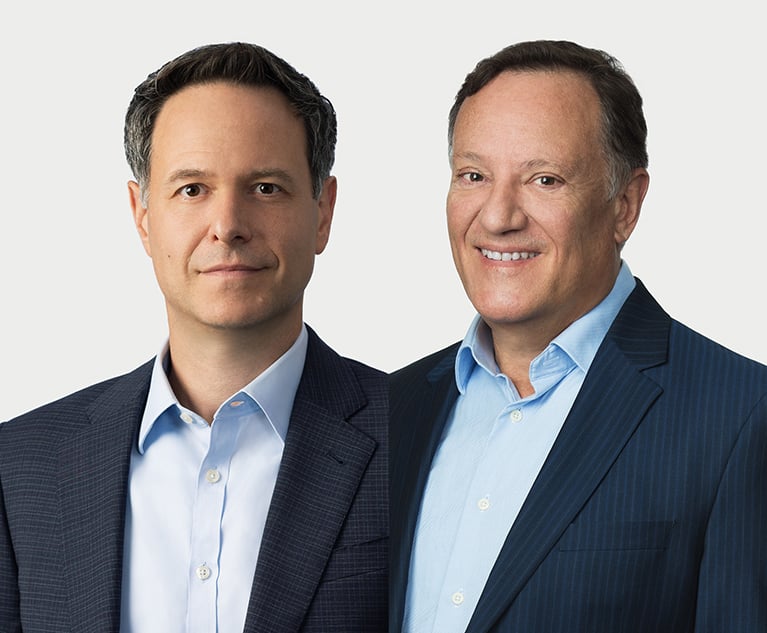Computer Generated Models: Intellectual Property and Advertising Risks
Virtual models and influencers may function as trademarks, as works of visual art, as likenesses of real people, or as combinations of all three, raising new issues of intellectual property ownership and protection and implicate right of publicity and/or privacy concerns. CGI models and advertisements featuring them could also be subject to regulatory scrutiny both at the federal and state levels.
March 22, 2019 at 03:20 PM
6 minute read
 When you scroll through Instagram or other social media platforms looking for the latest fashion trends, you may no longer be seeing just the Kardashians all the time, but instead new celebrities or influencers that are simply creations of computer-generated imagery, or “CGI.” These virtual models are already drawing substantial followers of their own on social media, generating revenue from brand campaigns and even “collaborating” with actual designers, fashion and cosmetic companies. The CGI model known as Shudu, with over 150,000 Instagram followers, describes herself as “the world's first digital supermodel.” Shudu, the creation of a British photographer, has appeared in campaigns for Balmain, and Rihanna's beauty company, Fenty Beauty. Taking it a step further, CGI “personality” Lil Miquela's Instagram account portrays a full-blown fictional life, which has generated over 1.5 million followers, a music career and a takeover of the Prada Instagram account during Milan Fashion Week.
When you scroll through Instagram or other social media platforms looking for the latest fashion trends, you may no longer be seeing just the Kardashians all the time, but instead new celebrities or influencers that are simply creations of computer-generated imagery, or “CGI.” These virtual models are already drawing substantial followers of their own on social media, generating revenue from brand campaigns and even “collaborating” with actual designers, fashion and cosmetic companies. The CGI model known as Shudu, with over 150,000 Instagram followers, describes herself as “the world's first digital supermodel.” Shudu, the creation of a British photographer, has appeared in campaigns for Balmain, and Rihanna's beauty company, Fenty Beauty. Taking it a step further, CGI “personality” Lil Miquela's Instagram account portrays a full-blown fictional life, which has generated over 1.5 million followers, a music career and a takeover of the Prada Instagram account during Milan Fashion Week.
Technology will soon allow brands to design their own digital models to reflect their desired image or aesthetic, “hire” models created by someone else, or allow real-life models to create avatars of themselves, capable of appearing in virtual fashion shows anywhere in the world. But before embracing CGI as a marketing tool, it is important for brands and users of CGI models to understand the business and legal pitfalls, in particular when the brand engages third parties to create such CGI models or otherwise licenses CGI from third parties.
Virtual models and influencers may function as trademarks, as works of visual art, as likenesses of real people, or as combinations of all three, raising new issues of intellectual property ownership and protection and implicate right of publicity and/or privacy concerns. CGI models and advertisements featuring them could also be subject to regulatory scrutiny both at the federal and state levels.
Intellectual Property
If a brand regularly uses a particular CGI image, or a CGI model's name to sell its products to the point the CGI image or model begins to be identified with the brand, that image or model may function as a trademark or source identifier, just like a Disney animated character, or the Geico gecko. A CGI model could have its own trademark rights, either directly owned by the brand, or requiring an appropriate license from a CGI model's creator. Moreover, using a CGI model as a trademark entails some risk of infringing another party's trademark rights, even unintentionally without the proper pre-clearance required to ensure that there is no potential for a trademark claim. Such a claim could come either from a CGI model owner that hasn't given the brand the necessary license to use the model, or the owner of an existing trademark that closely resembles the model.
CGI models may also be protected by copyright, which attaches to creative works, including visual works like animations, videos, and photographs, as soon as they are created and fixed in a tangible medium of expression. If a brand uses a CGI model created by a non-employee, it should ensure it has secured the necessary rights, through assignment and/or work for hire agreements to effectuate all rights necessary to use the copyrighted work. Similar to trademark, it is possible a CGI model could infringe the copyright in an existing model (or other character) if it is deemed substantially similar under U.S. Copyright laws.
Right of Publicity
The use of CGI models also raises right of publicity and privacy concerns. In 2014, Lindsey Lohan sued the creators of video game Grand Theft Auto for right of publicity infringement, claiming one of the game's characters' appearance and background resembled her own. Lohan v. Take-Two Interactive Software, 31 N.Y.3d 111 (2018). More recently, the actor who played Carlton on the 1990s sitcom Fresh Prince of Bel-Air is suing the creators of Fortnite for using a dance he made famous on the show in its games. Ribeiro v. Take-Two Interactive Software, Inc. et al, 2:18-cv-10417 (C.D. Cal. Dec. 17, 2018). While there may be defenses to such claims, use of CGI models may give rise to similar risks. At a minimum, brands using CGI models should carefully avoid overt references to well-known people, whether in a CGI model's appearance, name, story, or actions.
Advertising
Finally, advertisements featuring CGI models could be subject to Federal Trade Commission and state AG oversight. Section 5 of the Federal Trade Commission Act prohibits unfair or deceptive advertising, and state attorneys general are also tasked with protecting consumers through similar state legislation. The FTC has taken action against agencies, brands, and influencer networks and even sent warning letters to numerous influencers for failure to disclose whether posts are sponsored; a requirement under the FTC Endorsement and Testimonial Guidelines intended to inform consumers that posts are advertisements. The New York Attorney General recently settled with a company that sold fake accounts and “likes” on social media. In the matter of Investigation of Letitia James in Devumi, Assurance No. 19-008. Although the FTC has said in media interviews that it does not yet have any specific guidelines pertaining to CGI models, failure to disclose that a model is CGI may be construed as a deceptive omission, particularly if it could create false expectations about a products performance, such as with cosmetics or fitness equipment or if a consumer simply does not understand the connection between a brand and such CGI model. Brands will need to consider the same rules of ensuring proper disclosure and terminating non-compliant partners when hiring a third party to create and manage the social communications of a CGI model endorsing its products.
Takeaways
Brands that choose to use CGI models should consider the following:
• Conducting intellectual property clearance;
• Obtaining appropriate assignments and licenses, including indemnification for intellectual property and right of publicity liability, or other assurances from the model's creators, and
• Training and monitoring marketing teams to comply with the FTC Endorsement and Testimonial Guidelines, erring on the side of transparency when in doubt.
Jeffrey Greene is an IP partner at Fenwick & West, focusing his practice on strategic foreign and domestic brand counseling and protection. Vejay Lalla is a technology transactions partner at Fenwick, focusing his practice on technology, IP and digital media and e-commerce transactions. Allyson Madrid is an IP associate at Fenwick, concentrating her practice on trademark matters that support clients in the technology and life sciences industries.
This content has been archived. It is available through our partners, LexisNexis® and Bloomberg Law.
To view this content, please continue to their sites.
Not a Lexis Subscriber?
Subscribe Now
Not a Bloomberg Law Subscriber?
Subscribe Now
NOT FOR REPRINT
© 2025 ALM Global, LLC, All Rights Reserved. Request academic re-use from www.copyright.com. All other uses, submit a request to [email protected]. For more information visit Asset & Logo Licensing.
You Might Like
View All
Beastie Boys, Rimon Law Allege Copyright Infringement by Chili's in Social Media Videos
3 minute read
Gibson Dunn Recruits S&C Partner to Co-Lead M&A Practice, in 2-Partner Hire

Trending Stories
- 1States Accuse Trump of Thwarting Court's Funding Restoration Order
- 2Microsoft Becomes Latest Tech Company to Face Claims of Stealing Marketing Commissions From Influencers
- 3Coral Gables Attorney Busted for Stalking Lawyer
- 4Trump's DOJ Delays Releasing Jan. 6 FBI Agents List Under Consent Order
- 5Securities Report Says That 2024 Settlements Passed a Total of $5.2B
Who Got The Work
J. Brugh Lower of Gibbons has entered an appearance for industrial equipment supplier Devco Corporation in a pending trademark infringement lawsuit. The suit, accusing the defendant of selling knock-off Graco products, was filed Dec. 18 in New Jersey District Court by Rivkin Radler on behalf of Graco Inc. and Graco Minnesota. The case, assigned to U.S. District Judge Zahid N. Quraishi, is 3:24-cv-11294, Graco Inc. et al v. Devco Corporation.
Who Got The Work
Rebecca Maller-Stein and Kent A. Yalowitz of Arnold & Porter Kaye Scholer have entered their appearances for Hanaco Venture Capital and its executives, Lior Prosor and David Frankel, in a pending securities lawsuit. The action, filed on Dec. 24 in New York Southern District Court by Zell, Aron & Co. on behalf of Goldeneye Advisors, accuses the defendants of negligently and fraudulently managing the plaintiff's $1 million investment. The case, assigned to U.S. District Judge Vernon S. Broderick, is 1:24-cv-09918, Goldeneye Advisors, LLC v. Hanaco Venture Capital, Ltd. et al.
Who Got The Work
Attorneys from A&O Shearman has stepped in as defense counsel for Toronto-Dominion Bank and other defendants in a pending securities class action. The suit, filed Dec. 11 in New York Southern District Court by Bleichmar Fonti & Auld, accuses the defendants of concealing the bank's 'pervasive' deficiencies in regards to its compliance with the Bank Secrecy Act and the quality of its anti-money laundering controls. The case, assigned to U.S. District Judge Arun Subramanian, is 1:24-cv-09445, Gonzalez v. The Toronto-Dominion Bank et al.
Who Got The Work
Crown Castle International, a Pennsylvania company providing shared communications infrastructure, has turned to Luke D. Wolf of Gordon Rees Scully Mansukhani to fend off a pending breach-of-contract lawsuit. The court action, filed Nov. 25 in Michigan Eastern District Court by Hooper Hathaway PC on behalf of The Town Residences LLC, accuses Crown Castle of failing to transfer approximately $30,000 in utility payments from T-Mobile in breach of a roof-top lease and assignment agreement. The case, assigned to U.S. District Judge Susan K. Declercq, is 2:24-cv-13131, The Town Residences LLC v. T-Mobile US, Inc. et al.
Who Got The Work
Wilfred P. Coronato and Daniel M. Schwartz of McCarter & English have stepped in as defense counsel to Electrolux Home Products Inc. in a pending product liability lawsuit. The court action, filed Nov. 26 in New York Eastern District Court by Poulos Lopiccolo PC and Nagel Rice LLP on behalf of David Stern, alleges that the defendant's refrigerators’ drawers and shelving repeatedly break and fall apart within months after purchase. The case, assigned to U.S. District Judge Joan M. Azrack, is 2:24-cv-08204, Stern v. Electrolux Home Products, Inc.
Featured Firms
Law Offices of Gary Martin Hays & Associates, P.C.
(470) 294-1674
Law Offices of Mark E. Salomone
(857) 444-6468
Smith & Hassler
(713) 739-1250







